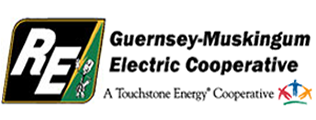Guernsey-Muskingum Electric Cooperative is making investments to improve our service to members and strengthen the electric grid. In August, we finished replacing all 17,148 of our members’ meters with a new, advanced metering system that will offer more efficient and accurate meter readings. This metering system monitors and reads members’ electric meters and displays the data for members in an easy-to-understand way that can help them manage their energy usage.
Here’s why the transition to advanced meters is a benefit to GMEC members:
- Automatic readings
Advanced meters send accurate, real-time energy usage data to the co-op via radio frequency. This two-way communication happens automatically, which means no more manual meter readings!
- Improved energy usage information
Members now have the ability to view valuable usage data in monthly, daily, and even hourly formats, helping them to budget, forecast future bills, and find energy savings opportunities.
- Faster outage response times
Advanced meters communicate with the co-op in real-time. When GMEC loses connectivity with a meter during an outage, we are able to pinpoint the exact location and respond more quickly. Plus, advanced meters improve electric service reliability and power quality, which contributes to fewer outages, blinks, and surges.
- More effective load management
GMEC can better monitor voltage levels with advanced meters to improve power quality, reduce the number of spikes, blinks, and shortages, and forecast future demand.
We have our members’ best interests at heart and believe advanced meters will help us better serve you! For more information about the new metering system, give us a call at 800-521-9879 or check out our FAQ section below.
AMI stands for Advanced Metering Infrastructure. AMI meters, referred to by GMEC as advanced meters, are digital devices that measure and record electricity usage in real-time.
These advanced meters automatically collect and transmit metering information back to our office via radio frequency. This process is similar to other technologies you are familiar with, such as baby monitors and garage door openers.
Smart meters benefit our members with greater accuracy in billing, faster outage response, and detailed data that Guernsey-Muskingum and its members can use to manage electric use much more accurately. Plus, members will no longer have to manually check their meter and report meter readings.
No! Guernsey-Muskingum already switched your metering system to a smart meter. All conversions were completed in August of 2024.
No. Your electric usage will now be shared with the co-op automatically and in real time. No more manual meter readings!
Smart meters communicate directly and immediately with the co-op, allowing for more comprehensive and faster data collection. Smart meters help utilities like Guernsey-Muskingum collect accurate electric usage data that can help us monitor usage and improve billing and resource management.
Smart meters can also communicate outage information directly to the co-op and help us prevent outages by identifying failing equipment or overloaded situations before they turn into power outages. If an outage occurs, the system will rapidly collect information from individual meters and report the outage so power can be restored, even if the member is away from home.
Members’ energy usage and operational data will be used by Guernsey-Muskingum Electric Cooperative for billing purposes, troubleshooting, and resolving problems with equipment or services. We treat our members’ personal information and data confidentially. Our use of load data will be strictly limited to the provision of electric service. We will not disclose, share, rent, lease, or sell individual customer data to any third party or affiliate for any other purpose.
Research conducted by the Federal Communications Commission (FCC), the Electric Power Research Institute, the Utilities Telecom Council and others has found no negative health impacts from digital meters that send information via a wireless communications network. The radio frequencies (RF) emitted by digital meters fall well below the maximum recommended in federal guidelines.
The following information is from the American Cancer Society: "How much RF energy that people are exposed to from the smart meter depends on how far they are from the smart meter antenna and how the smart meter sends its signal. The frequency and power of the RF waves given off by a smart meter are similar to that of a typical cell phone, cordless phone, or residential Wi-Fi router. Smart meters typically send and receive short messages about 1 percent of the time. Because the smart meter antenna usually is located outside the home, people are much farther away from the source of RF waves than some other possible sources of exposure to RF radiation, such as personal cell phones and cordless phones. In addition, walls between the person and the smart meter’s antenna further reduce the amount of RF energy exposure. This means that the amount of RF radiation that someone would be exposed to from a smart meter is probably much lower than the amount that they would be exposed to from other sources."
